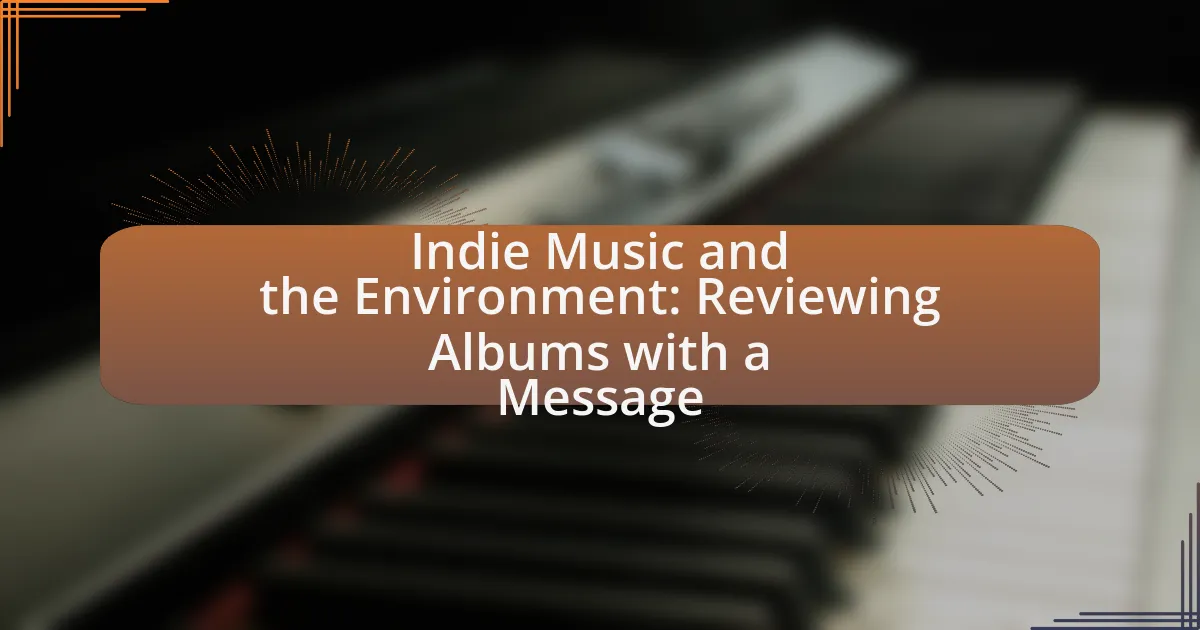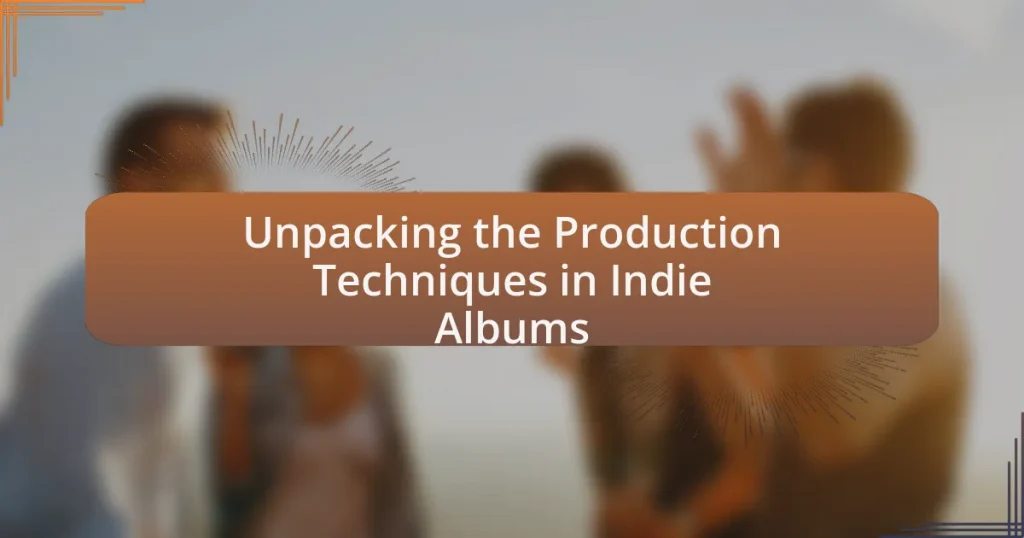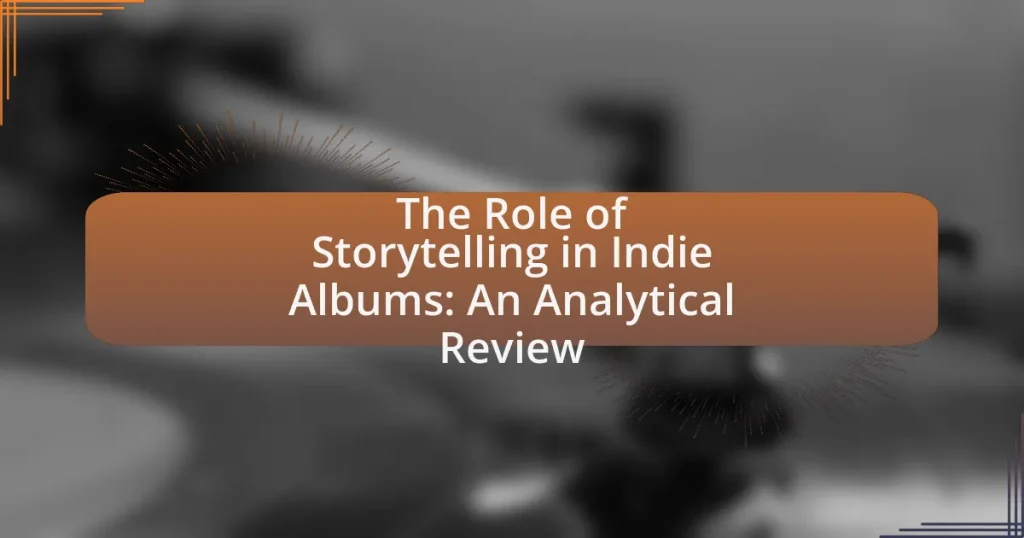Indie music, characterized by its independent production and distribution, often addresses environmental issues through its lyrics and themes. This article explores the connection between indie music and environmental advocacy, highlighting how artists like Bon Iver and Fleet Foxes incorporate ecological messages into their work. It examines common environmental themes in indie music, notable albums with significant environmental statements, and the role of the indie music community in supporting sustainability initiatives. Additionally, the article discusses how listeners can engage with indie music to promote environmental awareness and support artists focused on ecological issues.
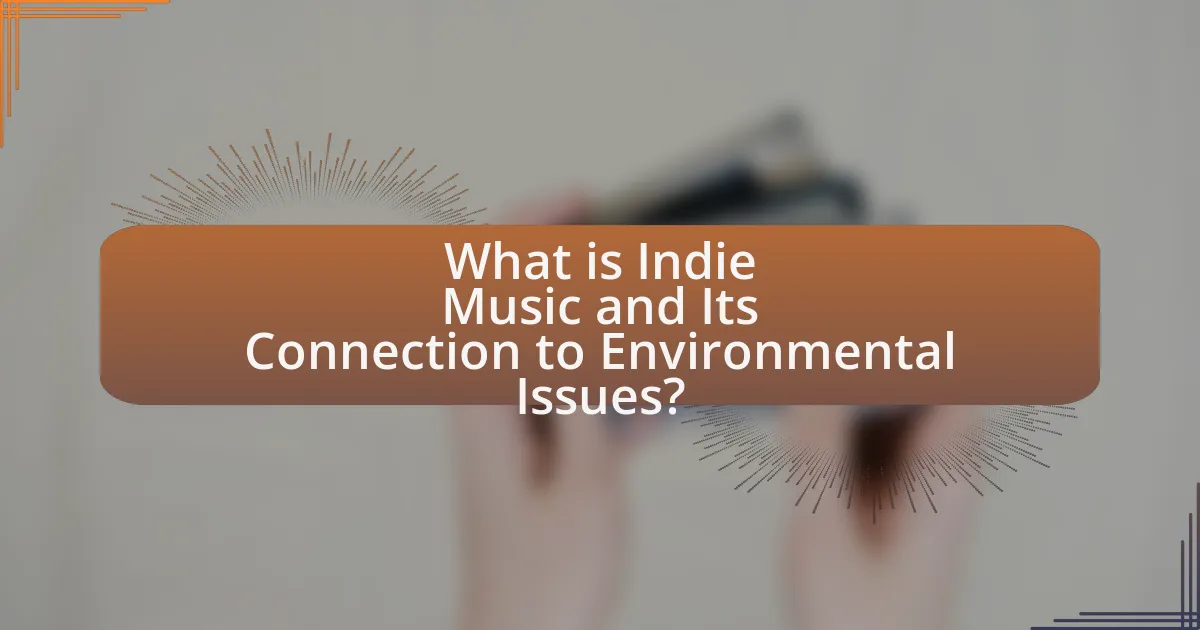
What is Indie Music and Its Connection to Environmental Issues?
Indie music is a genre characterized by its independent production and distribution, often reflecting personal and social themes, including environmental issues. Many indie artists use their platforms to raise awareness about climate change, pollution, and sustainability, integrating these themes into their lyrics and public messaging. For instance, artists like Bon Iver and Fleet Foxes have addressed nature and environmental concerns in their music, while festivals such as the Green Man Festival promote eco-friendly practices. This connection between indie music and environmental issues highlights the genre’s role in advocating for ecological awareness and inspiring action among listeners.
How does indie music address environmental themes?
Indie music addresses environmental themes by incorporating lyrics and concepts that highlight ecological issues, promote sustainability, and raise awareness about climate change. Artists within the indie genre often use their platforms to discuss the impact of human activity on nature, as seen in songs that reference pollution, deforestation, and the urgency of environmental action. For example, the band Fleet Foxes in their album “Helplessness Blues” reflects on humanity’s relationship with nature and the need for environmental stewardship. Additionally, artists like Bon Iver and Sufjan Stevens have created music that evokes imagery of natural landscapes, emphasizing the beauty of the environment and the importance of preserving it. This thematic focus not only resonates with listeners but also encourages a cultural dialogue around environmental responsibility.
What are some common environmental messages found in indie music?
Common environmental messages found in indie music include themes of climate change awareness, nature preservation, and critiques of consumerism. Artists often use their lyrics to highlight the urgency of environmental issues, such as rising temperatures and habitat destruction, urging listeners to take action. For instance, songs like “Big Yellow Taxi” by Joni Mitchell emphasize the loss of natural spaces due to urban development, while bands like Fleet Foxes celebrate the beauty of nature and the need to protect it. These messages resonate with audiences, reflecting a growing concern for ecological sustainability within the indie music scene.
How do artists incorporate environmental themes into their lyrics?
Artists incorporate environmental themes into their lyrics by addressing issues such as climate change, pollution, and conservation. For example, many indie musicians use metaphors related to nature to highlight the fragility of ecosystems and the impact of human activity. Specific songs often reference deforestation, ocean degradation, or the urgency of environmental activism, creating a narrative that resonates with listeners. A notable instance is the song “Big Yellow Taxi” by Joni Mitchell, which critiques urban development and environmental destruction, emphasizing the loss of natural spaces. This approach not only raises awareness but also encourages listeners to reflect on their relationship with the environment.
Why is indie music a suitable platform for environmental advocacy?
Indie music is a suitable platform for environmental advocacy because it often prioritizes authenticity and grassroots movements, allowing artists to connect deeply with their audiences on pressing issues like climate change. This genre typically embraces independent production, which fosters a culture of creativity and experimentation, enabling musicians to address environmental themes in innovative ways. For instance, artists like Ben Howard and Florence + The Machine have incorporated environmental messages into their lyrics and public personas, raising awareness about ecological issues. Additionally, indie music festivals frequently promote sustainability practices, further aligning the genre with environmental advocacy.
What makes indie artists more likely to engage with environmental issues?
Indie artists are more likely to engage with environmental issues due to their strong emphasis on authenticity and social responsibility. This genre often attracts individuals who prioritize personal expression and community impact, leading them to address pressing global concerns like climate change in their work. For instance, many indie musicians incorporate eco-friendly practices into their tours and promote sustainability through their lyrics and public statements, reflecting a commitment to environmental advocacy. Additionally, studies indicate that indie artists often have a closer connection to their fan base, allowing them to effectively raise awareness about environmental issues and inspire action among their listeners.
How does the indie music community support environmental initiatives?
The indie music community supports environmental initiatives through fundraising concerts, awareness campaigns, and partnerships with environmental organizations. Many indie artists organize benefit shows where proceeds are donated to environmental causes, such as climate change advocacy and wildlife conservation. For instance, events like “Earth Day” concerts have raised significant funds for organizations like Greenpeace and the Sierra Club. Additionally, indie musicians often use their platforms to promote eco-friendly practices, encouraging fans to adopt sustainable habits. This commitment is reflected in the lyrics of many indie songs that address environmental themes, further amplifying the message.
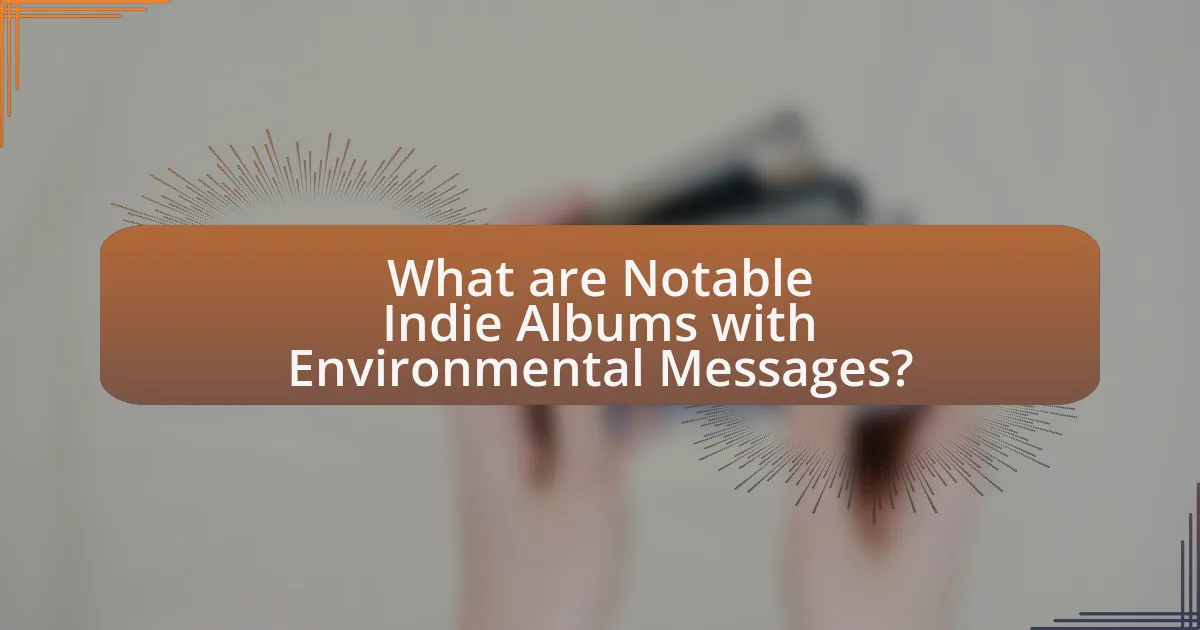
What are Notable Indie Albums with Environmental Messages?
Notable indie albums with environmental messages include “The Earth Is Not a Cold Dead Place” by Explosions in the Sky, which emphasizes the beauty of nature and the urgency of environmental preservation through its instrumental compositions. Another significant album is “The Wilderness” by John Mayer, where the lyrics reflect on humanity’s relationship with nature and the impact of climate change. Additionally, “The Future Will Come” by The Long Winters addresses themes of sustainability and ecological awareness. These albums not only showcase artistic expression but also raise awareness about environmental issues, making them impactful contributions to the indie music scene.
Which albums have made significant environmental statements?
Albums that have made significant environmental statements include “Earth” by Lil Dicky, which raises awareness about climate change and biodiversity loss through its star-studded collaboration and impactful lyrics. Another notable album is “The 1975” by The 1975, featuring themes of climate activism and sustainability in its songs. Additionally, “Songs for the Earth” by various artists showcases a collection of tracks aimed at promoting environmental consciousness. These albums effectively communicate urgent environmental issues, engaging listeners and encouraging action.
What themes are prevalent in these albums?
The prevalent themes in albums focused on indie music and the environment include environmental activism, climate change awareness, and nature appreciation. These albums often convey messages about the urgency of addressing ecological issues, reflecting the artists’ concerns about the planet’s future. For instance, many tracks highlight the impact of pollution and deforestation, urging listeners to take action. Additionally, themes of personal connection to nature and the beauty of the natural world are frequently explored, emphasizing the emotional and spiritual significance of the environment. This thematic focus aligns with a growing trend in the indie music scene, where artists use their platforms to advocate for sustainability and environmental justice.
How have these albums influenced public perception of environmental issues?
Albums within the indie music genre have significantly influenced public perception of environmental issues by raising awareness and promoting activism through their lyrics and themes. For instance, artists like Bon Iver and Fleet Foxes have incorporated nature and environmental concerns into their music, prompting listeners to reflect on ecological issues. The album “For Emma, Forever Ago” by Bon Iver, released in 2007, features themes of isolation and nature, which resonate with listeners’ emotional connections to the environment. Additionally, the song “White Winter Hymnal” by Fleet Foxes highlights the beauty of nature while subtly addressing its fragility. These artistic expressions have led to increased discussions about climate change and conservation, as evidenced by the rise in environmental movements and initiatives that cite music as a catalyst for change.
How do specific songs within these albums convey their messages?
Specific songs within albums focused on environmental themes convey their messages through lyrical content, instrumentation, and emotional resonance. For example, in the album “The Earth” by the band The Tallest Man on Earth, the song “The Gardener” uses vivid imagery to illustrate the relationship between humanity and nature, emphasizing the importance of stewardship. Similarly, in “The Wilderness” by Explosions in the Sky, the track “The Ecstatics” employs expansive soundscapes to evoke feelings of awe and reflection about the natural world, reinforcing the urgency of environmental awareness. These songs effectively communicate their messages by combining poetic lyrics with evocative musical elements, creating a powerful call to action regarding environmental issues.
What lyrical techniques do artists use to highlight environmental concerns?
Artists use various lyrical techniques to highlight environmental concerns, including vivid imagery, metaphor, and personification. Vivid imagery allows artists to create striking visual representations of environmental degradation, making the issues more relatable and urgent for listeners. For example, descriptions of polluted landscapes or dying ecosystems evoke emotional responses that encourage awareness and action. Metaphors often compare environmental issues to personal struggles, illustrating the interconnectedness of human experience and nature, which can deepen the listener’s understanding of the urgency of these concerns. Personification gives human traits to nature, emphasizing its vulnerability and the consequences of neglect, thereby fostering a sense of responsibility among audiences. These techniques effectively engage listeners and provoke thought about environmental issues, as seen in songs like “Big Yellow Taxi” by Joni Mitchell, which critiques urban development and its impact on nature.
How do musical styles enhance the environmental messages in these songs?
Musical styles enhance the environmental messages in these songs by using specific instrumentation, rhythms, and lyrical themes that resonate with listeners. For instance, folk-inspired indie music often incorporates acoustic instruments and storytelling elements that evoke a sense of connection to nature, making the environmental message more relatable and impactful. Additionally, the use of upbeat tempos in certain indie tracks can create an optimistic tone, encouraging action and awareness regarding environmental issues. Research indicates that music with strong emotional resonance can significantly influence listeners’ attitudes and behaviors towards environmental conservation, as seen in studies published in the Journal of Environmental Psychology. This demonstrates that the chosen musical styles not only complement the lyrical content but also amplify the overall message, fostering a deeper engagement with environmental themes.

How Can Listeners Engage with Indie Music and Environmental Advocacy?
Listeners can engage with indie music and environmental advocacy by actively supporting artists who promote environmental themes in their work. Many indie musicians incorporate messages about sustainability and climate change into their lyrics and public personas, which can inspire listeners to take action. For instance, artists like Billie Eilish and Jack Johnson have been vocal about environmental issues, encouraging fans to participate in eco-friendly initiatives. Additionally, listeners can attend concerts that support environmental causes, purchase merchandise that contributes to sustainability efforts, and share music that raises awareness about ecological concerns on social media platforms. This engagement not only amplifies the artists’ messages but also fosters a community dedicated to environmental advocacy.
What actions can listeners take to support indie artists focused on the environment?
Listeners can support indie artists focused on the environment by purchasing their music and merchandise directly from their official websites or platforms that prioritize artist revenue. This action ensures that a larger portion of the funds goes directly to the artists, allowing them to continue their environmentally conscious work. Additionally, listeners can promote these artists on social media, sharing their music and messages to raise awareness about environmental issues. Engaging with the artists through comments and discussions can also foster a community around their cause. Supporting live performances, especially those that incorporate eco-friendly practices, further amplifies their impact. According to a 2021 report by the Music Industry Research Association, direct fan support significantly boosts indie artists’ sustainability efforts, highlighting the importance of listener engagement in promoting environmental initiatives within the music industry.
How can fans promote environmental awareness through music?
Fans can promote environmental awareness through music by actively engaging with artists who address ecological themes in their lyrics and supporting campaigns that align with these messages. For instance, fans can share songs that highlight environmental issues on social media platforms, thereby amplifying the artists’ messages to a broader audience. Additionally, participating in or organizing events such as benefit concerts or eco-friendly festivals can raise funds and awareness for environmental causes. Research indicates that music can influence public perception and behavior regarding environmental issues, as seen in campaigns like “Music for the Earth,” which successfully raised awareness about climate change through popular music.
What role do social media and streaming platforms play in this engagement?
Social media and streaming platforms significantly enhance engagement in the indie music scene by providing artists with direct access to their audience. These platforms enable musicians to share their environmental messages and connect with listeners who are passionate about similar causes. For instance, according to a 2021 report by the International Federation of the Phonographic Industry, 70% of music listeners discover new music through social media, illustrating the platforms’ effectiveness in promoting indie artists and their environmentally themed albums. Additionally, streaming services allow for the easy distribution of music, making it accessible to a global audience, which amplifies the reach of messages related to environmental issues.
What are some practical tips for discovering new indie music with a message?
To discover new indie music with a message, explore platforms like Bandcamp and SoundCloud, which feature independent artists often focused on social and environmental themes. These platforms allow users to filter music by genre and tags, making it easier to find artists who align with specific messages. Additionally, follow music blogs and playlists dedicated to indie music, such as Indie Shuffle or The Line of Best Fit, which regularly highlight artists with meaningful lyrics. Engaging with online communities on social media platforms like Reddit or Facebook groups can also provide recommendations from fellow music enthusiasts who prioritize lyrical content.
How can listeners find playlists or compilations that focus on environmental themes?
Listeners can find playlists or compilations that focus on environmental themes by utilizing music streaming platforms like Spotify, Apple Music, and YouTube, which often feature curated playlists dedicated to environmental issues. These platforms typically have search functions that allow users to enter keywords such as “environment,” “eco,” or “sustainability” to discover relevant playlists. Additionally, organizations and environmental advocacy groups frequently create and share playlists on social media, which can be accessed through their official pages or websites. For instance, Spotify has a dedicated section for playlists that promote awareness about climate change and conservation, showcasing artists who address these themes in their music.
What resources are available for exploring indie music and environmental activism?
Resources for exploring indie music and environmental activism include platforms like Bandcamp, which features artists who focus on environmental themes, and Spotify playlists dedicated to eco-conscious music. Additionally, organizations such as Music Declares Emergency advocate for climate action within the music industry, providing a network for artists and fans to engage in activism. Research indicates that indie musicians often use their platforms to raise awareness about environmental issues, as seen in the 2021 report by the UK Music Industry, which highlights the growing trend of eco-friendly initiatives among indie artists.
